MIGRAINES
A migraine is a headache that can range from mild to severe, and also may include nausea and a sensitivity to light and sound.
What to Look For

Neck Problems/Misalignments: Your upper neck has a high density of nerve fibers that can become irritated and lead to a migraine headache. When a bone puts pressure on a nerve, you may develop a migraine and have little relief with pain meds or at home remedies.

Neck Problems/Misalignments: You may also notice other symptoms like sensitivity to light, sound, or visual changes. The only way to alleviate that irritation is to fix the problem, and take the pressure off the nerve.

Neck Dysfunction
- Your neck has a high density of nerve fibers that when irritated, can lead to a migraine. Those can range from the base of the neck and temple all the way to behind the eyes.

Sensory Overstimulation: In some cases, excess light, smell, and / or sound can trigger a migraine.

Food: Some people have food sensitivities or allergies that they are unaware of. These foods can trigger a migraine.

Stress: In a high stress mode, the brain releases chemicals that can make the symptoms of a migraine worse. It will also increase your risk of increasing the severity and frequency of migraines and other health conditions.

Medications: Ask your doctor if any medications you are taking can lead to migraines.

Lack of Sleep: Sleep loss can increase your risk of developing migraines.

Hormones: Imbalanced hormones have been shown to play a role in migraine development.
What Symptoms Can It Produce
- Moderate to severe pain within the head or facial region, can be on one or both sides
- May develop pain at the base of the skull and neck.
- Can produce an aura (visual changes)
- You may notice sensitivity to light, sound, or even smell.
- If severe can cause nausea or vomiting or even blurred vision.
What to Do

- Get precise adjustments from a Chiropractor to the upper neck to take pressure off the nerves (if it is indeed stemming from the neck). They will usually stem from the upper 4 bones of the neck.
- Get extra sleep- Sleeping helps you to recover from migraines but also allows for less light to allow for overstimulation of the sensory nerves of the eyes or head.
- Take Magnesium – Magnesium has been found to be very helpful in treating migraines. The American Migraine Foundation suggest that taking a 400-500 mg supplement of Magnesium oxide daily can help prevent migraines.
- Use Bluelight Glasses – These special glasses help to reduce the amount of blue light to the eyes while using a computer screen. By doing so, you can prevent one common trigger of migraines. This is highly recommended if you spend more than 3 hours in front of a computer or screen per day.
- Diet Change – Avoid foods and beverages that trigger migraines – specifically those high in sugar or artificial sweeteners.
- Have your hormones tested – the most accurate is often a blood test to see if hormonal imbalance is a component leading to your migraines.



